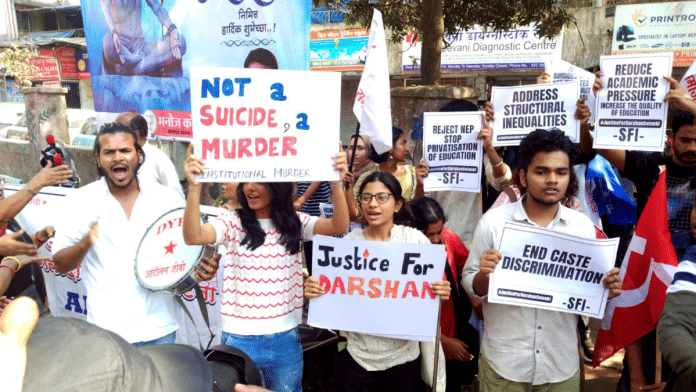New Delhi: Highlighting the “disturbing pattern” of student suicides in the country, the Supreme Court has formed a National Task Force (NTF) to come out with guidelines to address and mitigate the underlying causes.
Between 2019 and 2021, 35,950 students died by suicide in India, according to a submission by the Ministry of Social Justice and Empowerment in December 2023. While 10,335 student suicides were recorded in 2019, it was 12,526 in 2020 and 13,089 in 2021, the ministry had informed the Lok Sabha.
In fact, the top court mentioned the National Crime Records Bureau (NCRB) data for 2021 that showed over 13,000 students lost their lives by committing suicide that year. Suicide cases have been reported from premier higher educational institutions such as NITs, IIMs and IITs as well.
Retired SC judge Shripathi Ravindra Bhat will head the 10-member NTF as its chairperson. With liberty to conduct “surprise inspections”, the task force will also look into the systemic discrimination faced by students, especially due to their caste.
Monday’s verdict by a SC bench of Justices Jamshed B. Pardiwala and R. Mahadevan came after the top court heard an appeal by the parents of IIT-Delhi students Ayush Ashna and Anil Kumar. In their plea, the parents allege that their children were victims of caste-based discrimination as they belong to scheduled castes and had been murdered. Ayush and Anil were found dead in their hostel rooms on 8 July and 1 September, 2023.
ThePrint explains the mandate and composition of the task force that will have to furnish an interim report within four months and a final report within eight months.
NTF mandate
Representatives from diverse fields like the National Centre for Promotion of Employment for Disabled People, as well as individuals from the field of psychology and former director of the Centre for Women’s Development Studies will be part of the NTF. The founder of Aman Satya Kachroo Trust, a non-profit organisation, is also a part of the task force.
These experts will see through the intersection of various subjects which ensures that none of the underlying factors leading to suicides and its prevention are missed out.
The ex-officio members of this task force will be the secretaries of the Department of Higher Education, Ministry of Education, Department of Social Justice & Empowerment, Ministry of Social Justice & Empowerment, the Ministry of Women and Child Development, and the Department of Legal Affairs, Ministry of Law and Justice, GOI.
The NTF, the Supreme Court said, will examine the various causes leading to suicides “including but not limited to ragging, caste-based discrimination, gender-based discrimination, sexual harassment, academic pressure, financial burden, mental health related stigma, discrimination based on ethnicity, tribal identity, disability, sexual orientation, political views, religious belief or any other grounds”.
The proper identification of gaps and loopholes—which lead to student suicides—is the first step on the path of ensuring better mental health resources and support systems, it said.
Secondly, an in-depth evaluation of the existing policies and laws which apply to the higher institutions “concerning ragging, caste-based and gender-based discrimination, sexual harassment, mental health support, support for students facing academic challenges, financial support to students in need of funds, etc” is to be done.
This is because ensuring equitable access to education lawfully is key to a fair and inclusive learning environment, the top court said. It is important to keep a check on the systemic discrimination which the students could be facing due to their identity.
The judgement also stated that the NTF is to propose significant amendments, which are to be made to the “existing legal and institutional frameworks to ensure stronger enforcement, accountability, and preventive measures”. These, it added, would be to “address existing gaps, create a more inclusive and supportive academic environment, and ensure equal opportunities for members of marginalised communities”.
With societal landscapes changing, keeping the policies up to date is important to help institutions adapt to new challenges faced by the students, the top court said.
The SC has also given a special authority to the NTF to conduct any “surprise inspections” as they could reveal any matter which is not being stated by the institutional authorities.
Examining the most significant factors for the increase in student suicides, the court mentioned how “a purely score-based education system, coupled with the extreme competition for limited seats in premier educational institutions” puts extreme pressure on students. Furthermore,“caste-based discrimination and brutality in the form of ragging” which is often hidden by the institutions is violative of the right to education and dignity of students.
In these situations, the SC bench said, “the sensitisation of students and the faculty members” to ensure that campuses become safe spaces, which are equal for students coming from different walks of life.
Lastly, the judgement identifies the universities “responsible for the well-being and holistic development of their students”. And, failure to do so in the status quo, establishes a lack of institutional empathy and accountability by the higher educational institutions.
“The duty of the college authorities is not just to ensure academic excellence of the students but also to ensure their mental well-being, and not just exercise authority and control over students but also to provide support in times of distress,” it added.
(Ruchi Bhattar is a fifth-year-law from the University of Calcutta and is interning with ThePrint)
(Edited by Tony Rai)
Also Read: How CAG is appointed & why a petition in SC has called the process unconstitutional






